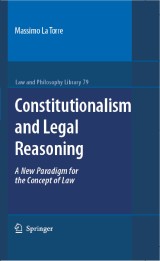Details

Constitutionalism and Legal Reasoning
Law and Philosophy Library, Band 79
|
149,79 € |
|
| Verlag: | Springer |
| Format: | |
| Veröffentl.: | 10.04.2007 |
| ISBN/EAN: | 9781402055959 |
| Sprache: | englisch |
| Anzahl Seiten: | 192 |
Dieses eBook enthält ein Wasserzeichen.
Beschreibungen
This book, which consist of three chapters and two appendices, is intended to connect subjects that have usually been considered as detached or not strongly connected: constitutionalism, legal argumen- tion and legal ethics. Its main contention is that contemporary consti- tionalism pushes towards a new style of legal reasoning, which needs to take into account moral criteria and principles and that eventually the interpretative and moralist approach will lead to a somewhat unort- dox and less authoritarian concept of law. A constitution to be taken seriously and as a distinct and superior source of law, will end up referring to some sort of constitutional justice or judicial review. And constitutional reasoning and justice need to make recourse to principles but principles to be given an operative content should be elaborated through some form of moral reasoning. This r- soning however, if it does not want to betray the spirit of constitutional democracy and the very idea of a constitution as a special moment of self-determination, could not be just Platonism, a cognitivism without roots in the practice of public discourse and deliberation. So that cons- tutionalism will not really do without a public sphere and some activism of the latter. But if this is so, the traditional concept of law based on hi- archy, commands, prescription, sanction, and in the last instance violence, becomes obsolete. A law which is a command cannot be congruent with a practice ruled by discourse, that is, I argue, with constitution.
<P>Preface. Part I: Law as Constitution. 1. Rhetoric and Practical Reason. 2. Constitutionalism and Legal Positivism. 3. From State Law to Constitutional State, or, from Herrschaft to "Discourse".-Part II: Legal Argumentation and Concepts of Law. 1. Rhetoric and Practical Reason. 2. Legal Reasoning Redeemed. 3. Contemporary Doctrines. 4. Law as Discourse and Constitution.- Part III: The Practice of Law and Legal Ethics. 1. "Jurists, bad Christians". 2. Ambiguity of Deontological Rules. 3. Two Opposed Paradigms. 4. Legal Ethics and the Concept of Law. Epilogue.- Appendix A: Natural Law: "Exclusive" Versus "Inclusive". Appendix B: Robert Alexy's Constitutional Rights Theory.</P>
<P>This is a search of a model for a humane law -- where the cruelty ban is still in force. This book however is not intended as an utopian enterprise; the humane law which is looked for is not for the future, nor is it meant as a reform project, or as a programme for new institutions to come. here the contention is that positive law is better understood, if it is not too easily equated with power, force, or command. Law -- it is shown -- is more a matter of discourse and deliberation, than of sheer decision or of power relations. Constitutionalism, legal argumentation, legal ethics -- three fundamental moments of our daily experience with the law -- are there to witness that this view may be right. Now a "constitutional" view of the law and its practice and the connected discoursive approach to legal reasoning can offer interesting solutions also to legal ethics. If we take legal reasoning seriously, and conceive it in a "liberal" way comprising both lawyers and judges, so that adjudication is both a task for advocates and judges, the requirement of separation of powers on the one side is already full of implications for lawyers' deontology: the role of a lawyer will not be allowed to encroach with the one fulfilled by the statesman. On the other side, the claim of rightness intrinsic in legal discourse cannot avoided by lawyers. So that they could no longer be seen as defenders of clients' interestes, but of their rights. And rights are claims to be right.. Thus the requirement of justice, or better a certain threshold imposed on the tolerable injustice of the legal claim raised, will be unescapable not only for the judge, but to the lawyer as well. The general idea of this book may unfortunately run counter recent developments in the international arena and more generally in the less palpable Zeitgeist. It might well be that, like Hegel's owl that takes flight at sunset, a conceptual pattern is set forth while the corresponding institutional practice is beginningto die out. </P>
<P></P>
<P></P>
An original connection between theories of legal reasoning and concepts of constitutional state Establishing a stimulating relationship and a fruitful interaction between advocacy and the fundamentals constitutionalism A book for advocates who intend to make justice to their role and responsibility in a democratic polity Assessing how much "lawyers" (Juristen) are still "bad Christians" (böse Christen)

















